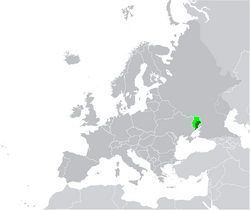Novorossiya (confederation): Difference between revisions
No edit summary |
the sources use "Federal States" as a description not as a state name |
||
| Line 2: | Line 2: | ||
{{Use dmy dates|date=May 2014}} |
{{Use dmy dates|date=May 2014}} |
||
{{Infobox country |
{{Infobox country |
||
|conventional_long_name= |
|conventional_long_name=Novorossiya |
||
|native_name= |
|native_name= Новороссия |
||
|common_name=Novorossiya |
|common_name=Novorossiya |
||
|image_flag = Flag_of_new_russia_party.png |
|image_flag = Flag_of_new_russia_party.png |
||
Revision as of 12:12, 25 May 2014
Novorossiya Новороссия | |
|---|---|
 | |
| Status | Unrecognized state |
| Capital | Donetsk |
| Official languages | Russian, Ukrainian[1] |
| Religion | Russian Orthodox (official)[2] |
| Government | |
• People's Governor | Pavel Gubarev |
• Prime Minister | Alexander Boroday |
• Commander in Chief | Igor Girkin |
| Independence from Ukraine | |
• Declared | 24 May 2014 |
The Federal States of Novorossiya (Russian: Федеративное государство Новороссия; Federativnoe Gosudarstvo Novorossiya) is a self-proclaimed confederation in eastern Ukraine sharing a border with Russia and Ukraine. It was declared on 22 May 2014 and formalized on 24 May when leaders of the unrecognized Donetsk People's Republic and Lugansk People's Republic signed a treaty on their merger.[2][3] While a loose literal translation would be New Russia, English-language media mostly leave the name untranslated.[4][5][6][7]
History
Background
Formation
The New Russia Party, founded on 13 May 2014 in Donetsk, Ukraine,[8] declared on its first congress of 22 May 2014 the formation of a new self-declared state named 'Novorossiya', harkening back to the Tsarist Novorossiya. The congress was attended by pro-Russian separatist officials of the Donetsk People's Republic, Donbass People's Militia as well as by the Donetsk Republic leader Pavel Gubarev, writer Alexander Prokhanov,[9] political scientist and Eurasia Party leader Aleksandr Dugin, and Valery Korovin.[10][11] The state would, according to Dugin, have its capital city in Donetsk, Russian Orthodox Christianity as the state religion, and would nationalize major industries.[2] According to Gubarev the state would also include (the major cities currently not under control of separatists) Kharkiv, Kherson, Dnipropetrovsk, Mykolaiv and Zaporizhia.[12][13] Two days later, the self-appointed governors of the Donetsk and Lugansk Republics signed a document behind closed doors formalizing their merger into the new confederation.[14]
Government and politics
Economics
Land, its subsoil, water, flora and fauna, as well as major industrial and financial assets created by "the labor of the people," are public property, and can not be privately owned. Large property, industrial and financial assets will be owned by the state. Remuneration of each person will be a measured by ones "usefulness of the work to society."[1]
Government
The supreme legislative authority of the Novorossiya is the "People's Council," formed on the basis of nomination by the Soviets of People's Representatives or labour groups. Representatives will be held accountable to the head of the National Council, elected from among its members.[1]
The head of state of the executive body is the chairman, represented by the Head of the National Council and approved by the National Council.[1]
Language
The official state language is Russian, and the use of other languages is free for the purpose of communication.[1]
Military
The armed forces of Novorossiya are carried out by the People's Self-Defence and the People's Militia, which are both voluntary and professional. The People's Council reserves the right to announce the mobilization of reservists in the case of "aggravation." All officers must swear allegiance to the people of Novorossiya, and breaking of the oath will be punishable by "exceptional punishment."[1]
Religion
All spiritual and religious education will belong to the Russian Orthodox Church. The state allows for freedom of religion except in cases it deems would "destroy the fabric of society and social harmony."[1]
See also
- 2014 pro-Russian unrest in Ukraine
- Pavel Gubarev
- Donetsk–Krivoy Rog Soviet Republic
- List of active separatist movements in Europe
- 2014 Crimean crisis
- Luhansk People's Republic
References
- ^ a b c d e f g "ПРОГРАММА Общественно-политического движения "Партия НОВОРОССИЯ"". Novorossia. 23 May 2014.
- ^ a b c Babiak, Mat (22 May 2014). "Welcome to New Russia". Ukrainian Policy.
- ^ "Donetsk, Lugansk People's Republics unite in Novorossiya". Voice of Russia. 24 May 2014.
- ^ "Ukrainians vote in key presidential election despite eastern unrest". CNN. 25 May 2014. Retrieved 25 May 2014.
- ^ "'Novorossiya,' the latest historical concept to worry about in Ukraine". Washington Post. 18 April 2014. Retrieved 25 May 2014.
- ^ "East Ukraine separatists seek union with Russia". BBC. 12 May 2014. Retrieved 25 May 2014.
- ^ "Pro-Russian Separatists in Ukraine Reject Putin's Call to Delay Vote". Wall Street Journal. 8 May 2014. Retrieved 25 May 2014.
- ^ "Donetsk announces creation of Novorossiya Party". Kyiv Post. 13 May 2014.
- ^ Young, Cathy (21 May 2014). "Fascism Comes to Ukraine -- From Russia".
- ^ Window on Eurasia: To Save Russia and Himself, Putin Must Become a National Bolshevik, Izborsky Expert Says
- ^ "Состоялся учредительный съезд ОПД "Партия Новороссия"". NovoRossia. 22 May 2014.
- ^ Template:Uk icon In Donetsk, created the party "New Russia", Ukrayinska Pravda (23 May 2014)
- ^ Ukraine crisis timeline, BBC News
- ^ http://www.unian.net/politics/921422-smi-terroristyi-iz-dnr-i-lnr-obyedinilis.html


